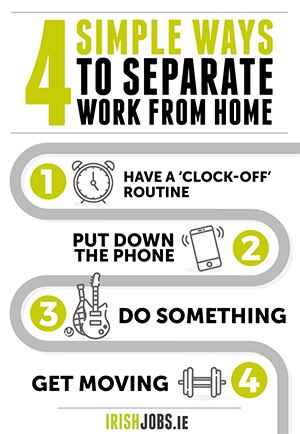In today’s always-on world, it can feel like the work never ends. With access to a smartphone or laptop, it’s easy to spend the evening hours answering calls, sending emails and finishing assignments.
We say it’s time to switch off. With precious few hours left in the evening, it’s important to use them in a way that ensures you go to bed both relaxed and fulfilled.
While you shouldn’t stress yourself out building a rigid after-work schedule, you should have a rough plan of what you’d like to do so you don’t spend the evening idly scrolling through Instagram.
Here are four simple ways to help you separate work from home and achieve a better work-life balance.
Have a ‘clock-off’ routine
Whether you finish at five or six o’clock, make sure you clearly signal to your brain that work is over until tomorrow.
Create a ‘clock-off’ routine. It could be as simple as bringing your coffee mugs and plates to the dishwasher, tidying up your desk, or writing out a to-do list for tomorrow.
Whatever you do, leave your work behind. That means no ‘quick tweaks’ to assignments at home and no emails unless they’re absolutely life-and-death.
When you get home, change your clothes. Get out of your office garb and into something more casual. Don’t get too relaxed, though—you’ve still got plenty of time left to be productive and have fun.
Put down the phone!
Nothing writes off an evening faster than getting sucked into the black hole that is your smartphone. So, put it down. Lock it away if you must. You’ve spent an entire day sitting at your desk, at the lunch table and probably on the bus or train reading emails, news apps, and social networks.
Give yourself a break from the digital world. Will your life be any worse off if you don’t see that old college acquaintance’s holiday snaps right now? Does that group chat really have to be read and answered right now?
Some of us have jobs that require us to work after hours from time to time. While you may not be able to ignore your phone completely, don’t live in constant fear of it. If you’re really needed, you’ll be called. As much as possible, set aside at least an hour to unwind and relax.
Do something
And no, that doesn’t mean mindlessly flicking through your phone. (You’ve put yours away, haven’t you?)
Do something manual. Cook your dinner using fresh ingredients and experiment with new recipes. Read a book. Write. Pursue a hobby or start a new project. Play an instrument or properly sit back and listen to music. Meet friends and family or go to a local event. Build a table. Arrange flowers. Paint a picture. Exercise (more on that in a moment). Even washing the dishes or ironing your shirts will help to focus your mind on a simple, methodical task.
The key takeaway is this: do anything that doesn’t involve staring at a screen for the rest of the evening. Not only is there an increasing body of evidence that suggests excessive screen time is bad for your health, bright light late into the night could ruin your sleep cycle and doom you to a tomorrow of exhaustion and bad temper.
Get moving
Humanity evolved on the African savannah, not in an open-plan office. We are built to move and put our body through its paces.
Sitting at a desk all day weakens our muscles and body generally, making us more susceptible to tiredness and disease. It might be easy for a younger worker to shrug this off now, but it won’t be in twenty or thirty years.
Sure, after a hard day at work, kicking back on the sofa seems like the easiest, the most natural thing in the world. Physically exerting yourself, on the other hand, does not, especially if you have a long commute or children to care for and put to bed.
Remember that most if not all of the battle to exercise is psychological. Once you’re actually at the gym or out for a run, your body will reward you. You’ll be sweaty, maybe in a bit of pain, but you’ll feel great and sleep easier. What’s more, you’ll be making a long-term investment in your physical and mental health.

IrishJobs.ie has been helping people find the job they want for over 20 years. Our team is delighted to share our job hunting tips and advice with you.
